This week, rockstar Tyler Glenn will launch his new solo album, “Excommunication.” As a teaser, he has already released two music videos, Shameless, and the highly symbolic and controversial exmormon coming-out video, Trash. You can take three minutes to watch it now. I recommend full screen.
We exmormons have never had an anthem before. Not officially. Sure, we’ve clung to some of the obvious mainstream pop greats, like REM’s Losing My Religion, Tori Amos’s Crucify, or one of my favorites, Sarah McLaughlin’s Witness. (I’ve got a whole playlist of atheist-themed music right here.)
As true-blue Mormons, we had a hymnal cram-packed with songs that praised the Church and all its trappings. We had many musical ways to express our feelings. But since leaving, we have to make do with whatever generic anti-religious or faith-transitiony music we happen to come across, and bend it to fit our specific experiences.
But not anymore, thanks to rockstar Tyler Glenn, frontman for Neon Trees, a Mormon who came out as gay two years ago, and who optimistically clung to the belief that his Church, which claims to espouse “the pure love of Christ,” had a place for him.
For those of us who hoped the LDS Church was trending to broaden their range of invites to the spiritual banquet, our hopes were crushed last year, when they made it clear that gay, bi, trans, and queer folk (like me) would be denied the full earthly blessings of marriage and family. Not only that, but our children would also be denied the sacred saving ordinances and blessings of the Gospel, and all the social benefits that come along with it, the most important of which is a sense of belonging in your family and community.
No other “sin” in Mormon canon has this designation.
This policy change has come to be known as “The Exclusion Policy,” and in my mind, it encourages and excuses further bullying among Mormons against LGBT people and their children.
This must have been a soul crushing time for someone like Glenn, who did as he was taught and stood up for the Church, who risked mockery from worldly critics, who remained loyal, and sincerely believed the Church was making progress toward opening their arms to welcome LGBT members fully into the fold.
It was soul crushing for me, and I’ve been out of the Church for fifteen years.
In response, Glenn has spent these months, especially since April when he released Trash, using his musical and speaking talents to express his deeply felt conflicts over this policy, over its effects on gay Mormon youth, over his faith crisis, over uncovering the lies the Church has taught, over his sense of betrayal, and over his exit from Mormonism. These past months, he has done as he was taught by the faith of his birth: He’s stood up for what he believes.
As much as we like to think human beings are rational, we primarily think in emotion, symbols, and imagery. This is what I mean when I speak positively of “spirituality”, this irrational aspect that is central to our humanity. Music is important for our spiritual selves. It is symbolic and resonates the multiple parts of our minds in sync toward a particular theme or idea in a way that words and logic can’t.
Music is a mantelpiece of Mormon culture, and I was a musical child. We were taught a scripture: “For [God’s] soul delighteth in the song of the heart; yea, the song of the righteous is a prayer unto me, and it shall be answered with a blessing upon their heads.” D&C 25:12
As a spiritual atheist, I have room in my symbolic mind for a bigger God than the Mormon God of my youth, a God who can delight in all kinds of songs, any song that arises from the sincere heart of man. Not only does he think the simple, off-tune passionate Primary song of a six year old is delightful, he also would think that the angry, critical, irreverent exmormon, mourning his loss in a high-production-value music video, is delightful. It is an honest expression of one of his children revealing genuine, raw pain, and pointing a much-needed accusatory finger at an organization which has legitimately wronged a whole class of people. Several classes of people, in fact: Gay Mormons, heterodox Mormons, exmormons. Or pretty much any Mormon who is, as Glenn described of himself and many of the rest of us have as well, a square peg in a round hole, a round hole which refuses to accommodate the shape of the peg, and expects the peg to contort until it is snapped in half.
Trash is a song of the heart that is worth delighting in. It’s the mark of a good artist who can make one line or symbol stand for two or three meanings. Its layers of symbolism accurately reflect what many of us Mormon square pegs can relate to. These are angry symbols, critical symbols, symbols that pull back the veil to discover that, instead of a pure Celestial Kingdom full of angels in white, and God himself with his unconditional love surpassing all human comprehension, instead we have found small men pulling levers and flipping switches to manipulate, at any cost, the hearts of God’s children entrusted to their stewardship. This is a justified anger, fairly earned by anyone who has been disillusioned and betrayed so deeply.
Trash begins with Glenn slouched, depressed, against an elevator door at the end of a low-rent hallway.
There is an all or nothing feeling within Mormonism. As it’s presented, you’re either in God’s grasp or Satan’s grasp at any given moment. When you feel like you’re losing your way, there’s a tendency to want to just give up entirely, to “give in to Satan”. No middle way is offered. That is the image Glenn evokes here. It is the vision we all feared as Mormons, that if we strayed, we’d end up… *shudder*… worldly. Throughout the video, Glenn seems like one of Mormondom’s worst enemies: Korihor. Glenn embraces this role.
He sits up as if with a realization that motivates him to action, and takes a swig of wine before revealing his epiphany:
“I think I lost myself in your new religion.”
For many lucky individuals, their religion mirrors their true selves. They fit without having to maim their souls. For people like me, I had to stuff my soul into Mormonism the way I’d cram an elephant into a high-school locker. I had to cut off parts of myself to fit. I had to shrink, deny, repress, even hate myself to be a good Mormon.
He crawls down the hallway toward the camera. “You say a prayer for me like a superstition.”
The default remedy for all ills within Mormonism is to pray. Preferably while fasting and reading the scriptures. Many Mormons would have reacted to his exit: “We can bring Tyler back if we pray for him!” Of course, this solution only works when it works (which is rarely), and utilizes confirmation bias to keep members believing.
“We were always made for love. We could always speak in tongues. On my knees and I’m seeing visions.” He raises his hands and eyes to the heavens.
I love this line, and his expression of it through his body language. It speaks to my own deeply held beliefs that no religion has a monopoly on morality and spiritual gifts. He’s saying that these gifts belong to every man; the Church doesn’t hand these out, exclusively to the obedient, like scout badges and door prizes. It is our birthright, as humans, to love and to attain deeper spiritual insights, all on our own, without authorities standing as admission-charging middle-men.
At this point, the video gets extremely offensive to believers. He turns to a defaced portrait of Joseph Smith, iconic and familiar to Mormons, only this version has a skull-mask painted over Brother Joseph’s face, and he sings, “You remind me that seven sins are deadly.”
Mormon doctrine teaches that sin leads to spiritual death. It halts our eternal progression and cuts us off from access to God through his agent, the Holy Spirit; neither member of the Godhead can tolerate being in the presence of evil. Yet this doctrine is a rouse, a distraction, a tool of control. It is a false and restrictive form of spirituality.
The Mormon Church prides itself on modern revelation from a “living” prophet. Yet here, the first prophet of the Restoration is dead. Spiritually dead. Not just Brother Joseph, but by implication, the modern prophet, who received his priesthood keys passed down through Joseph’s now bone-white hands, through a series of prophets who were just as dead.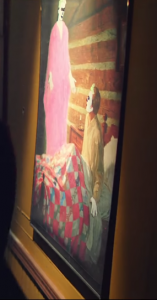
Further down the hall, we see the famous picture of Joseph’s first visit from the Angel Moroni, and in that, the messenger of the Restoration is also depicted this way. The message of Joseph’s Church is dead, too.
Life breathes, grows, changes. Life reacts to stimuli. Life loves. There is no life left in a Church which cannot grow to love unconditionally. The Church has sinned against Christ’s two greatest commandments: Love God with all your might, and love your neighbor as yourself. (Loving yourself is the implied 3rd commandment.) Matthew 22:36-40
The sin against love has killed the Church.
And while he sings the next line, “You used to baptize me when I wasn’t ready,” he spits on the Prophet. We can see splatters and streaks where he has spit on this image before.
True believing Mormons will be highly offended, yet do they realize that this is just a graven image, merely an idol that they’ve been commanded to not take seriously?
By spitting on the picture, he is baptizing the Church the way he was baptized: without consent.
It is a point of pride within Mormon doctrine that the Church does not practice infant baptism. It waits until the child is clearly old enough to understand what they are committing to when they dedicate their entire lives to the service of the Church, at the ripe old age of consent, which we all know is 8.
You can’t even get a credit card when you’re eight, much less consign your soul over to God with President Thomas S. Monson as the cosigner.
Sacrilege has forced the question of which is the greatest sin: Defacement of LDS idols? Or how we treat others?
Which is more offensive? A system which accepts nonconsensual baptism as desirable? Or a deeply pained individual spitting on a print that you can buy at Deseret Book?
Ironically, baptism is an ordinance which, thanks to the November Exclusion Policy, is now denied to the children of gay couples.
“Water never turns to wine. I’ve been drinking all the time.”
This line comes right after the baptism reference.
After baptism and confirmation, Mormons are allowed to participate in the weekly Sacrament ritual, much like Catholic Communion. Only unlike Communion, since Mormons aren’t allowed to drink alcohol, they use water instead of wine. Water is placed in tiny disposable cups and passed around the chapel. Each “worthy,” baptized person drinks, in remembrance of Christ’s blood, which was shed for them in the Garden of Gethsemene, where the Savior atoned for all our sins by suffering the pain we otherwise would have suffered, through the requirements of the eternal Law of Justice. He bled from every pore.
Just as there is no blood or wine in those little paper sacrament cups, there is no wine in that baptismal font, no substance. And no Jesus Christ at the wedding (or in the chapel Sunday morning) to work an alchemical miracle. The salt has lost its savor. (Matt 5:13) The son has asked for bread, and the Church has given a stone. He has asked for a fish, and the Church gave a serpent. (Luke 11:11) Without love, the blood of Christ’s atonement useless.
As a Mormon, I yearned for the milk to finally transform into spiritual meat, more warmth to fill the bosom like a tall glass of merlot, yet all I tasted was flavorless, colorless water. Necessary for survival, yet it does nothing to enhance life or bring fulfillment.
This line also reminds us that there are no miracles, at least, not the kind of self-evident miracles that break scientific laws. There is no proof in this pudding.
“I’ve been drinking all the time,” refers both to the figurative water and wine above, and as suggested by his opening swig, perhaps Glenn has been drinking quite a lot, to cope with his heart-rending pain in the months since the November Exclusion Policy. He swaggers through parts of this video like a drunk man, or like a man in serious pain and bewilderment. Or both.
Having gone through a similar process, of feeling betrayed by God, I could see this as an admission that he totally gave up trying not to sin, and he has turned to drink while he processes his grief. Leaving the Church is also accompanied by a sense of freedom after living in such a repressive system for so long. We exmormons call this “the adolescent phase,” and it can be a time of experimentation and extremes. (This feeling is expressed in his newer release, Shameless.)
The next line is repeated throughout the song: “I think of you whenever I see fire in the sky.”
Nearly every line speaks directly to me, but this one is more of a puzzle. I have been struggling to connect with it.
It could refer to the pillar of fire spoken of when Moses led the Israelites through the desert. This symbol is referenced in the LDS hymn, Redeemer of Israel, which I associate with the more famous LDS hymn, The Spirit of God (Like a Fire is Burning).
Or it could refer to the First Vision.
Or the sun. An LDS Primary song (for children) compares faith to knowledge, “Faith is knowing the sun will rise.” Yet faith, by definition, isn’t knowledge.
Perhaps it refers to the fires that are to come from the sky during the end times.
Or it could speak to being baptized by fire, since baptismal symbology figures largely in the rest of the song. Baptism by fire entails an ordeal: Unlike a baptism of water, which purifies your sins comfortably and instantly, fire is the hard way out. You have to endure the pain of experience. It is a rite of suffering.
Yet at least in suffering, there is substance.
Since this symbol has been so much harder to interpret, I even wondered if it could be a more personal reference to the 1993 movie, “Fire in the Sky“, based on a true story about alien abduction, which happens to feature a Mormon protagonist. I could see some rich metaphors here, but I don’t even know if Glenn has seen this movie. So I think this is likely a coincidence … (or is it?)
Perhaps, in the context of the rest of this verse, Glenn is saying that without the Church holding him back, the scales have fallen off his eyes and he can now have visions on his own terms. He can now find spiritual substance anywhere, even in the sky, in the sun; his water has finally turned to burning wine.
The chorus begins.
“Your friends think I’m a freak.”
As he sings this line, he seems pained and bewildered, as if he’s just now figuring it out.
Many members of the LDS Church (and other Christian Churches) think LGBT people are freaks of nature. Being gay isn’t “natural”. It purportedly goes against God’s prescribed order of family and gender roles. This is spelled out clearly both in the rhetoric and culture, but also in their near-scripture-level canon, The Proclamation on the Family.
Anyone who has felt like an outcast can feel the sting in this line. It is the sting of rejection and ostracism. It brings to mind a line from another song about outcasts, from Disney’s Hunchback of Notre Dame:
“I thought we all were the children of God.” (If you watch this, bring tissues.)
Next, Glenn asks, “What was in my drink?”
This line follows his talk of visions, and it has many layers of symbolism, especially in context of the other lines.
When you leave the protective walls of Mormonism, you get to see more of the world, both its lighter and darker sides. One lesson you learn quickly is that while drinking around strangers, you must guard your drink closely.
Roofies (or Mickeys) are the most common nonconsensual drink additive, drugs which cause a person to become suggestible, immobile, unaware of her surroundings, and it blacks out memory. These are known as date-rape drugs, because they are used to force unwilling people into sex.
The parallel here is unmistakable. Often, former members of high-demand religions (cults) refer to their experience as “spiritual rape”. The context of religion made us suggestible, willing to believe whatever nonsense was placed before us. It allowed religious leaders to make us vulnerable, to expose our souls so that they could take full advantage of us. Their lies penetrated our beings like parasites. We were in a fog, with little understanding of how we got there or why we acted the way we did. We lost control and ownership of our own bodies, not just for a night, but for a lifetime. They merged their religious persona to our own personalities until we could no longer tell the difference.
At wilder parties, drinks can be spiked with hallucinogenic drugs intended to give everyone an extra good time. Hallucinogens can lead to false visions, what a Mormon might call “counterfeit spirituality”. Glenn could be implying that the visions previously referenced, and his spiritual experiences as a Mormon, were hallucinations, false experiences brought on by the metaphorical drinking of so much empty water, which isn’t wine, but maybe it’s been spiked.
And of course, there is the clear reference to the slang phrase, “drinking the kool-aid,” which comes from the tragic mass murder in 1978, where Jim Jones took advantage of the unquestioning faith of his followers by convincing them to drink cyanide-laced FlavorAid. More than 900 people died.
In popular parlance, “to drink the kool-aid” means you’ve completely internalized the precepts of a dogmatic belief system, and now follow without question. “What was in my drink?” emotionally drives this point home for those of us who were willing to give everything we had, even our lives, to the Church.
The following line, “I can’t even think,” completes this thought and reinforces all of these symbols. The powerful sense of disillusionment creates the discomfort of cognitive dissonance, a psychological reality that affects all humans, yet the Church has reframed it as proof of the Church’s truthfulness… that is, LDS doctrine says that untruths will create a “stupor of thought” created by the Adversary. (D&C 9:9)
“But we’ve got history,” captures why some of us stay; and why those of us who leave still feel a yearning for our homeland. No matter how angry we get, no matter how many illusions we blast through, no matter how much harm we see this Church doing both to its own members and to the outside world we all inhabit, we can still yearn for space in the place where we came from.
Mormonism is a culture, an ethnicity. Try spending 20+ hours a week in Church-related activities, practicing the teachings, living the dietary and clothing restrictions, “being in the world but not of the world,” making and keeping sacred covenants, with your entire your family and community, from the time you are born. Try doing that for decades, and then just up and leave.
In slang, “we’ve got history” implies that a relationship is over, yet there is some kind of tie there. Emotional connections, common experiences, special memories, secrets, in-jokes, a bond that can never be replaced. Even if you dump someone for being an abusive asshole, it’s hard to let go. It might be the right choice, but it still hurts.
“In all of this, I lost myself.”
He reiterates the first line. And like living with an abusive partner, being in a controlling religion causes a loss of self. I argue that the LDS use of the mind control technique, “Doctrine over self,” literally rewrites the Church’s personality over parts of your own personality. The Church is true; this is what is most important. If you’re gay, you don’t fit. You are required to lose yourself – or die trying.
He continues with language evocative of a messy breakup. As he sings, “Maybe I’ll see you in hell,” the elevator opens up behind him, and the darkened scene becomes lighter in beat to the music. Members of the Church might think a sinner like Glenn is surly going to press the down button, and he’s on his way to hell (or the Mormon equivalent of hell) for making this sacrilegious video. Yet Glenn will see them there, because, by its own teachings, the LDS Church itself is damned for the lies it teaches and the harm it’s doing to “the least of these” (Matt 25:40), the trash, of God’s children.
“Ok, whatever,” he begins as he backs into the elevator. At this point, Glenn probably doesn’t even believe in hell. And just at the moment he’s offended those true-blue Mormons beyond any hope of forgiveness, the lights flicker he states the culminating point of the song:
“One man’s trash is another man’s treasure.”
He crosses his arms in assertive steadfastness. He’s sticking to this point. As he should.
This line means so very many things. It applies to all the concepts I discuss in this analysis. It invites the listener to question the conventional wisdom, the little sayings and concepts we’ve taken for granted our whole lives. It invites us to wonder if we’ve been calling evil good. If we’re been putting darkness for light, and light for darkness. (Isaiah 5:20)
There are many parables within Mormonism and Christianity about treasures. In Matthew, Jesus compared the Kingdom of Heaven to a pearl collector who found a single pearl of great price, and he sold all he had to own it. (Matt. 13:45-46)
In another passage, we read a parable about a man who gave each of his servants money to invest. One hid his money in a jar and buried it. The other two invested it and doubled their money. (Matt 25:14-30)
We were told to “store up treasures in heaven,” because earthly treasures can decay or be stolen. “For where your treasure is, there will your heart be also.” (Matt 6:19-21)
In the Book of Mormon, Nephi was commanded to kill Laban to obtain a treasure, the scriptures of their people, written on brass plates. “It is better that one man should perish than that a nation should dwindle and perish in unbelief.” (1 Nephi 4:13)
We’re expected to unquestioningly view the “treasure” in these stories as the Gospel. But Glenn’s application of this secular cliché forces us to ask questions about the things we unthinkingly value. Who is the trash here? What really is the treasure?
Throughout the video, Glenn trashes the sacred cows of Mormonism, and treasures what the Mormon Church has trashed about Glenn and others like him. Tired of being the one that constantly accepts derision without question or protest, while tip-toeing around the eggshells that constitute all that is precious to Mormonism, Glenn turns the tables. Flips them, even, just as Jesus Christ flipped the tables of the money changers in the temple.
That which is sacred has been profaned. And Glenn isn’t the one doing the sullying. He’s only here to point it out. And the only way to get our attention is through sacrilege.
He glares at the camera. He is really pissed. As he should be. The Church has trampled over everything Glenn thinks is sacred. It has trampled over him, and people like him, people like me. He is angry in defense of himself and in defense of the “least of these.” This is a righteous anger. It is the anger of someone who is sick of taking crap. It is the anger of an abuse victim who is tired of apologizing for the abuser and pretending it’s love, pretending he just “fell down the stairs,” pretending that he deserves it, and pretending that one day, they’ll change, if he only believes in them and stands by their side.
It is the anger that every exmormon has felt, the moment we realize that we’re not the trash.
Glenn has decided he’s a treasure.
He’s also decided that the Gospel of lies and abuse isn’t the treasure it purports to be.
The lighting has changed from the dim, dusty hallway to a blinking lavender strobe. This perhaps isn’t just a cool special effect. It perhaps signifies the confusing period of time while one is thinking of leaving the faith. There are patches of light and dark, both within one’s own soul, and towards the Church, as ambivalence creeps in, and as the Church’s secrets are slowly revealed. What once was in darkness coming into the light.
His very next act reveals much, and is probably the most profane thing he could have done in an LDS context. As the camera rotates around him dancing and covered in jewelry, we see the secret sacred Tokens of the Priesthood, the hand signs taught to us in the Temple, that we swore on threat of death that we never reveal to anyone.
Even as an exmormon, seeing these signs in this context is shocking. No longer a treasure, no longer sacred or secret. These are no longer pearls, and he casts them to viewers which the Church would call swine.
And yet, one man’s swine is another man’s human being deserving of respect. And that which is sacred should not be reserved for a select few who have paid the entrance fee.
In this, Glenn is rejecting the gatekeepers who claim to have the only rights to God’s power. He gives the tokens to himself. He is his own Priesthood now, his own clergy, his own spiritual leader. He rejects their monopoly on his spiritual fate.
“I said my flesh is weak but the spirit’s willing.”
This phrase typically means that a faithful Mormon wants to obey the commandments, but their hunger, or laziness, or sexual appetites have overcome them. While there is some wisdom in this phrase, perhaps a sense of awareness that we can sometimes desire two conflicting choices, in LDS context, this phrase is used to control, to stifle our own intuitions, to set aside our own wants and needs to do only what the Church asks of us. And if we don’t, we’re weak and carnal.
Within this line, as reflected by a line later in this verse, there seems to be a wistful longing for the LDS reality to be true. Or that this belief, which he inherited, is now in his past. He said it but isn’t currently saying it, because…
“And you would sell my soul just to make the killing.”
He makes a gesture here, of stabbing himself in the chest. This motion is especially evocative, just moments after he reveals the secret hand signs, for those of us who know that the temple ceremony used to include pantomimes of self-inflicted death: Slicing your own throat, and disemboweling yourself with a knife, as punishment for revealing the temple’s secrets. Which he has just done.
His words are even more powerful: The Church has taken advantage of Glenn’s willing spirit, a spirit which the Church would sell for material gain. This line turns the “Faustian bargain” on its head, the age-old religious trope of an individual who trades his soul for the fulfillment of a material dream: Love, riches, stardom.

I’ll give you worldly power if you can convince the masses to hate those who are different from them, in the name of love. No, I don’t want your soul, Popeman. I want theirs.
Yet churches are in the business of trading souls. If they can convince you to join the subscription membership club, a mere 10% of your income can buy you intangible rewards in the afterlife. Entire mansions await. You don’t need that money anyway because love of material possessions is sinful. So give it to them.
One-tenth of the income of roughly 4-8 million active Mormons, with minimal overhead or fixed costs, is quite a killing indeed. For-profit corporations wish they had such high margins.
We can also take “killing” more literally, because this income is stolen from the backs of people who are dying one way or another — either slowly, after decades of giving a fraudulent Church every ounce of the blood, sweat, and tears of themselves and their families, or instantly, in the epidemic suicides of depressed Mormons that makes Jonestown look like a Pioneer Day Picnic.
And we can it tie back to the idea of spiritual death. By selling souls for profit, the Church passes along its own spiritual death like a zombie outbreak. They are killing the free, divine sparks within all of us, all for material gain.
“If you wanted me to stay, I’d repent my days away.”
Again, this yearning, and again I can relate. When Glenn thought the Church loved him and wanted him, he sacrificed a great deal to remain steadfast. He even defended it to the world. He was willing to obey the commandments and suppress himself, to repent and hold to the iron rod. He would have done anything, but they keep rejecting him.
With the Exclusion Policy, the Church has made it clear that people like Tyler Glenn are not wanted. Not even if he lives a “clean” life.
And yes, the Church still says it wants LGBT members to stay. But abusers often say one thing and act another. “By their fruits ye shall know them,” Christ taught. (Matt 7:16) It is the actions of abusers, not their words, that count. And the actions of the Church are clear: LGBT people are not loved.
(All of Matthew 7 is applicable here, especially if you read it with a questioning mind, willing to apply it to the LDS Church itself. I’ve linked to the NIV because it is easier to understand.)
Glenn sings the chorus again, this time with the context of the new verse, and with different inflections. The first time around, he seemed ponderous, questioning, even surprised or confused. This time, he has made up his mind. He stares at the camera, resolute, decided, angry. For a moment, it looks like he’s ready to flip off the camera.
“Your friends think I’m a freak
What was in my drink?
I can’t even think, but we got history
In all of this, I lost myself
Maybe I’ll see you in hell
Okay, whatever
One man’s trash is another man’s treasure”
He once again folds his arms. As a child in Church, this was a sign of reverence, and here, it is a sign defiance, and that his mind is made up.
The lighting suddenly changes again, goes darker, and immediately after hearing the treasure line for the second time, we see pages blowing around the elevator, the same way some music videos depict money blowing everywhere, but also the way old McDonald’s bags get tossed about in a parking lot whirlwind. (I’m reminded of Fiona Apple’s lyric, “I thought it was a bird but it was just a paper bag.”) Upon closer examination, they appear to be scripture pages, perhaps even pages of the Book of Mormon, a treasure once buried in the earth, now just useless, torn out pages which he dances on, almost as if he is drunk.
“You keep throwing me out like, you keep throwing me out like, you keep throwing me out like… One man’s trash is another man’s treasure.”
Here, Glenn is clearly the trash, but he doesn’t actually say it. Instead, he rejects the implication, and asserts that he’s a treasure. He’s taken himself back, and along with it, his self-respect.
This is the climax of the story. He is decided. He is taking that step he knows he can never come back from. It is a scary step, one I know all too well.
Then he pulls out a tube of lipstick and draws a bold red X across his face.
This X has become a banner for exmormons, transforming what once was our shame into a badge of pride. It rejects the only role the Church has offered us, that of the forlorn, lost, broken, misguided, deluded prodigal son, into a symbol of activism, clearly-defined choice of intention, a taking back of our power from an institution that had no right to take it from us in the first place.
The lights come on, and the elevator, which we assumed had been going down (into hell?) now reaches the fire in the sky, where there is now a Celestial feel. He’s reached his own Celestial Kingdom, full of brightness and glory of the sun. A purity, but not as the Church has defined it about keeping the body pure and denying all worldly wants, but a purity of self, an integrity of self-actualization, of no longer allowing others to define us. There is freedom in this choice to leave. It is not an easy choice, and it is not without cost – friends and family, community, identity, belief, guidance, belonging – but it is the ultimate act of agency.
Glenn himself wrote about the meaning of the X. Here are his own words:
When Glenn repeats the chorus again, he is still angry, but the edges have softened. He is now more self-assured, free, and there is even a look of wistful sadness in his eyes, a hint of regret that it couldn’t have ended some other way. And yet, given his options, this is the only possible ending.
Rather than needing a Savior to take up his burden, he has shrugged off his own burden. He has pushed the “up” button on the elevator all on his own.
As he lies down in the bed of torn-out scripture, his body appears needlessly broken by the whole experience, like a corpse. He has found his freedom, but the damage has been done. The lights dim, and the video ends.
Though true-blue Mormons likely think this video is garbage, Trash is a treasure to exmormons. Like casting pearls before swine, it’s not that the content is objectively a pearl, and that the people are objectively swine. It is all in how you take it. And if you take ideas and institutions more seriously than you take people, you’ve missed the entire point of Christianity.
All this talk of treasure brings to mind another song, One Tin Soldier, by The Original Caste.
In Mormon folklore, this 1960s anti-war song is said to be a retelling of the Book of Mormon. I memorized the words at Mormon Girl’s Camp. It’s true: The song generally follows the overarching Book of Mormon plot. It tells of two nations who fight one another to extinction over a buried treasure… And when the conquerers finally uncover the prize, it reads, simply, “Peace on earth.”
It is a story of a people who were missing the whole point. Christ delivered the same message every single time he spoke to the Pharisees. He flipped tables in the temple because the religious leaders had become corrupt. They placed their trust in money, ritual, law, and judgement, obliterating with their rites and sacred cows our birthright: the spiritual simplicity of fostering empathy and compassion for our fellow man.
And are we not still fighting this same fight?
What is really sacred? The trappings of religion? Or our fellow human beings whom we’ve been commanded to love?
I hope that by freeing ourselves from the trappings of religious authority, we can finally find a bigger god, a god who, unlike the fifteen men in Salt Lake City, has room at his table for all his children.
Did I miss anything? What did this video say to you? Let me know in the comments.



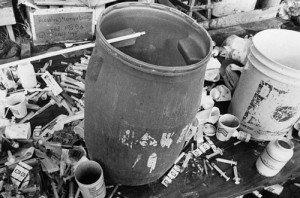
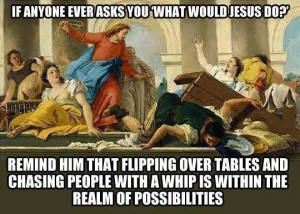


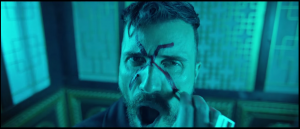


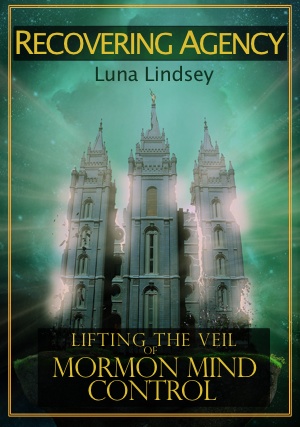
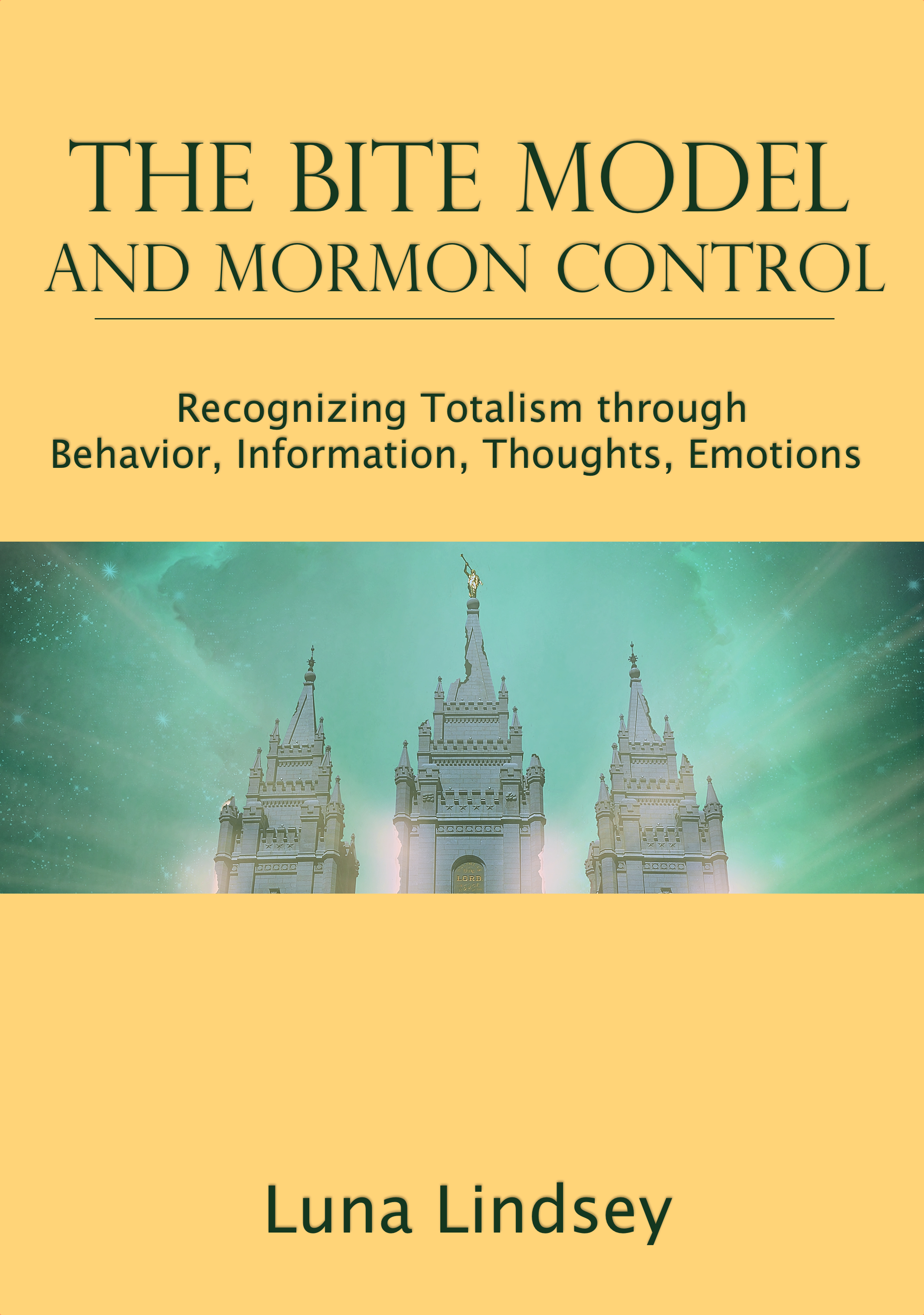
1 comment
I feel your pain. Although I am not LGBTQ I feel for your pain. As a former member of the LDS church I have traveled the roads of feeling left out, abandoned, and abused. A life wasted in living according to the dictates of the church’s conscience (if it had one). I pray for you and those others in the former LDS category.